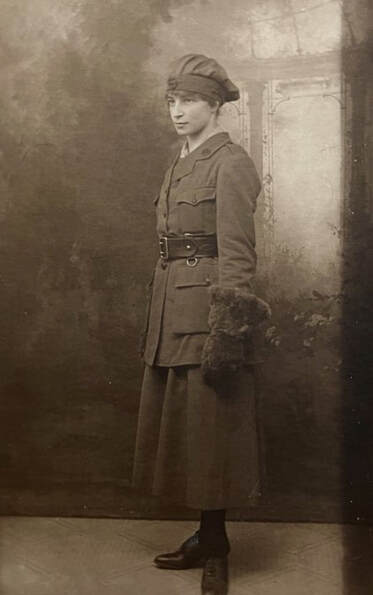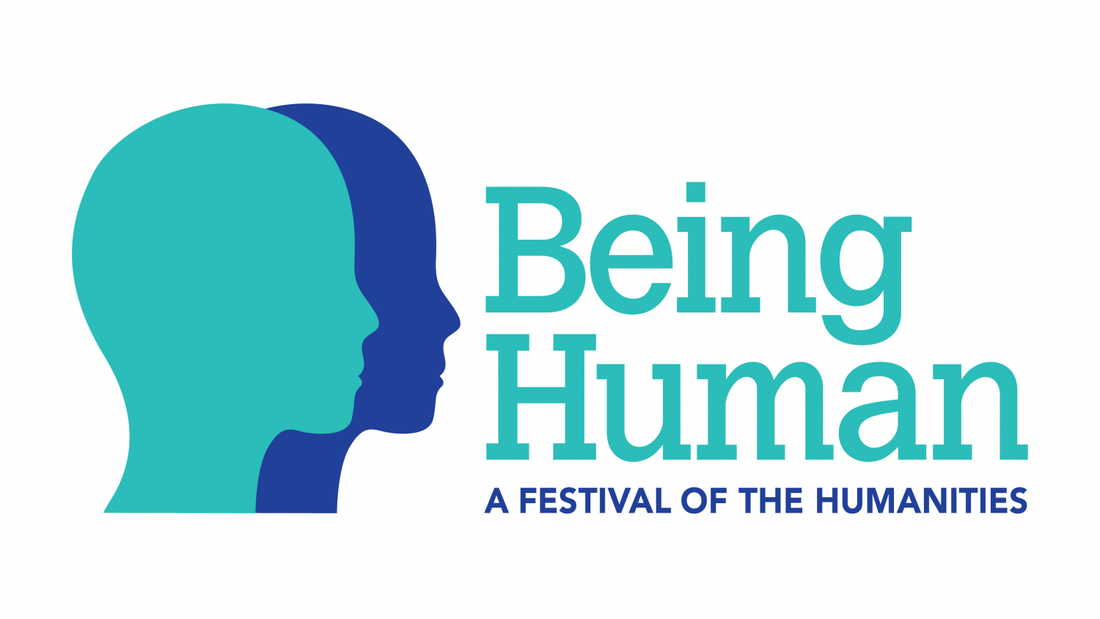CAREY FRASER (1896-1979) (later Mrs Marshall)

Carey Henrietta Mordaunt Baird Fraser was born on 22 May 1896 at Tornaveen, in the parish of Kincardine O’Neil. She was the youngest of five children of Major Francis Fraser of Tornaveen and his wife Alexia Mary Beatrice de Dombal Flora MacDonald.
In the first weeks of the First World War, in November 1914, Carey’s brother-in-law Archibald Robertson-Glasgow, was killed near Béthune. Then, in February 1915, her brother Lachlan died in the trenches at Ypres aged 21. Another brother Francis was seriously wounded on the first day of the Battle of Loos, in September 1915, but he survived and was invalided home.
Carey reached her 21st birthday in May 1917, and wanted to make her own contribution to the war effort. In early 1918, she joined the First Aid Nursing Yeomanry. Coincidentally, the FANY owed their very existence in the war effort to the dogged determination of another unsung Aberdeenshire heroine, Grace McDougall. Carey was sent to Châlons-sur-Marne, as one of ten drivers in a recently-formed new Unit 9 of the organisation – driving being viewed by many people at the time as a daring and glamorous activity entirely unsuitable for women. Their principal tasks included collecting casualties from ambulance trains, and
transporting them either to hospitals behind the lines or the Channel ports. This also involved stretcher-bearing and some auxiliary nursing duties.
Carey settled happily into a life of combined driving and vehicle maintenance. In a letter to her brother Francis she wrote “Am enjoying life no end. Is a great self satisfaction to turn into one’s ‘lavender’- scented camp-bed, as stiff as a plank feeling that a useful day’s work has been accomplished”[1]. On 17 March 1918, a girls’ “champagne supper” was rudely interrupted by artillery fire, “so rushed out and saw a huge fire, another Scot and I went further, until we arrived on the spot, a boche plane on fire, & were just in time to help extricate the servicemen, then the last bomb blew up. I didn’t enjoy the experience particularly…I’ve kept bits of its radiator etc”[2].
Whatever fun Carey may have extracted from her situation, she was in a very perilous place at a desperate time, when the Germans having made peace with Russia were turning to a determined push on the Western Front.
On the night of 18/19 July 1918, Carey was driving wounded soldiers to hospital during a bombardment. A torpedo struck in front of her vehicle and the orderly beside her was killed. Shrapnel lodged in her chest, liver and thigh. Two francs in her breast pocket possibly saved her life. Carey’s conduct that night earned her France’s highest military honour, the Légion d’Honneur and also the Croix de Guerre, which were conferred on her almost immediately as she lay in her hospital bed. The accompanying citation (translated) reads:
Charged, on the night of 18 and 19 July with transporting the wounded, accomplished her mission under a violent bombardment, suffering along the way two very serious injuries, her ambulance having been destroyed by the explosion of a torpedo, had the superb courage to walk the two hundred metres which separated her from the nearby hospital to notify the doctor on duty that she was bringing wounded to him. Having collapsed and been transported herself to the hospital to be operated on there, she insistently demanded not to be cared for until after the wounded for whom she was responsible.[3]
Carey enjoyed a period of well-deserved celebrity. Grace McDougall paid her a personal visit; she was promoted to the rank of Sergeant. Fifteen days after the event, when she was convalescing, Carey wrote her own account of the immediate aftermath of her hospitalisation: “I was brought to hospital at midnight on the 18th Thursday, operated next morning. In the afternoon General Gouraud came, read my citation & pinned on me the Croix de Guerre with palm telling me at the same time that the citation had been sent to Clemenceau. Next afternoon he came back with the Légion d’Honneur & embraced me fondly…On Sunday Gouraud gave a little séance for his poilus & in the end my photo was turned on the screen (with decorations) & he read out my citation…& everyone got up & the poilus howled then our National Anthem was played & everyone cheered. I wish I had been there…”.[4]
Carey was granted leave which she spent at Tornaveen, Dinan and Paris. In Paris on her way back to Châlons, she was introduced to President Poincarré and General Foch. She was there for the Armistice on 11 November and described the scene to Francis: “Everyone is putting out flags….Tonight we will all get drunk. Hurrah!”.[5]
Later that month, Carey’s unit proceeded to Strasbourg, where the FANY received sick and wounded prisoners released by the Germans. This process was a somewhat anxious one, presided over on the German side by soldiers armed with machine guns. Carey was also one of a substantial number of FANY volunteers who wanted to stay on and take part in post-war civil relief work. She was given her own new unit based at Compiègne.
On 14 December 1921, Carey married George Byng Marshall, son of George Marshall and the Hon. Sophie Byng of Hardres Court, Canterbury. George had served throughout the war as a Captain in the British Red Cross. He also was awarded the Croix de Guerre. They had two daughters: Sophie Carey born in 1922, and Georgina in 1928. They spent the inter-war years at Rapallo near Genoa, in a villa they renamed Tornaveen. Carey returned to Rapallo after the war, and spent the rest of her life there, leaving instructions that her mortal remains should be brought back and buried in the old Kirk at Kincardine O’Neil with her family, where they now rest.
Entry written by Jean Abbot.
Photograph and letter quotations by kind permission of the Fraser family.
[1] Letter to Francis - undated (probably February 1918)
[2] Letter to Francis 17 March 1917
[3] Translated from “L’Illustration” No. 3935 3 August 1918
[4] Letter to Francis 2 August 1918
[5] Letter to Francis 11 November 1918
In the first weeks of the First World War, in November 1914, Carey’s brother-in-law Archibald Robertson-Glasgow, was killed near Béthune. Then, in February 1915, her brother Lachlan died in the trenches at Ypres aged 21. Another brother Francis was seriously wounded on the first day of the Battle of Loos, in September 1915, but he survived and was invalided home.
Carey reached her 21st birthday in May 1917, and wanted to make her own contribution to the war effort. In early 1918, she joined the First Aid Nursing Yeomanry. Coincidentally, the FANY owed their very existence in the war effort to the dogged determination of another unsung Aberdeenshire heroine, Grace McDougall. Carey was sent to Châlons-sur-Marne, as one of ten drivers in a recently-formed new Unit 9 of the organisation – driving being viewed by many people at the time as a daring and glamorous activity entirely unsuitable for women. Their principal tasks included collecting casualties from ambulance trains, and
transporting them either to hospitals behind the lines or the Channel ports. This also involved stretcher-bearing and some auxiliary nursing duties.
Carey settled happily into a life of combined driving and vehicle maintenance. In a letter to her brother Francis she wrote “Am enjoying life no end. Is a great self satisfaction to turn into one’s ‘lavender’- scented camp-bed, as stiff as a plank feeling that a useful day’s work has been accomplished”[1]. On 17 March 1918, a girls’ “champagne supper” was rudely interrupted by artillery fire, “so rushed out and saw a huge fire, another Scot and I went further, until we arrived on the spot, a boche plane on fire, & were just in time to help extricate the servicemen, then the last bomb blew up. I didn’t enjoy the experience particularly…I’ve kept bits of its radiator etc”[2].
Whatever fun Carey may have extracted from her situation, she was in a very perilous place at a desperate time, when the Germans having made peace with Russia were turning to a determined push on the Western Front.
On the night of 18/19 July 1918, Carey was driving wounded soldiers to hospital during a bombardment. A torpedo struck in front of her vehicle and the orderly beside her was killed. Shrapnel lodged in her chest, liver and thigh. Two francs in her breast pocket possibly saved her life. Carey’s conduct that night earned her France’s highest military honour, the Légion d’Honneur and also the Croix de Guerre, which were conferred on her almost immediately as she lay in her hospital bed. The accompanying citation (translated) reads:
Charged, on the night of 18 and 19 July with transporting the wounded, accomplished her mission under a violent bombardment, suffering along the way two very serious injuries, her ambulance having been destroyed by the explosion of a torpedo, had the superb courage to walk the two hundred metres which separated her from the nearby hospital to notify the doctor on duty that she was bringing wounded to him. Having collapsed and been transported herself to the hospital to be operated on there, she insistently demanded not to be cared for until after the wounded for whom she was responsible.[3]
Carey enjoyed a period of well-deserved celebrity. Grace McDougall paid her a personal visit; she was promoted to the rank of Sergeant. Fifteen days after the event, when she was convalescing, Carey wrote her own account of the immediate aftermath of her hospitalisation: “I was brought to hospital at midnight on the 18th Thursday, operated next morning. In the afternoon General Gouraud came, read my citation & pinned on me the Croix de Guerre with palm telling me at the same time that the citation had been sent to Clemenceau. Next afternoon he came back with the Légion d’Honneur & embraced me fondly…On Sunday Gouraud gave a little séance for his poilus & in the end my photo was turned on the screen (with decorations) & he read out my citation…& everyone got up & the poilus howled then our National Anthem was played & everyone cheered. I wish I had been there…”.[4]
Carey was granted leave which she spent at Tornaveen, Dinan and Paris. In Paris on her way back to Châlons, she was introduced to President Poincarré and General Foch. She was there for the Armistice on 11 November and described the scene to Francis: “Everyone is putting out flags….Tonight we will all get drunk. Hurrah!”.[5]
Later that month, Carey’s unit proceeded to Strasbourg, where the FANY received sick and wounded prisoners released by the Germans. This process was a somewhat anxious one, presided over on the German side by soldiers armed with machine guns. Carey was also one of a substantial number of FANY volunteers who wanted to stay on and take part in post-war civil relief work. She was given her own new unit based at Compiègne.
On 14 December 1921, Carey married George Byng Marshall, son of George Marshall and the Hon. Sophie Byng of Hardres Court, Canterbury. George had served throughout the war as a Captain in the British Red Cross. He also was awarded the Croix de Guerre. They had two daughters: Sophie Carey born in 1922, and Georgina in 1928. They spent the inter-war years at Rapallo near Genoa, in a villa they renamed Tornaveen. Carey returned to Rapallo after the war, and spent the rest of her life there, leaving instructions that her mortal remains should be brought back and buried in the old Kirk at Kincardine O’Neil with her family, where they now rest.
Entry written by Jean Abbot.
Photograph and letter quotations by kind permission of the Fraser family.
[1] Letter to Francis - undated (probably February 1918)
[2] Letter to Francis 17 March 1917
[3] Translated from “L’Illustration” No. 3935 3 August 1918
[4] Letter to Francis 2 August 1918
[5] Letter to Francis 11 November 1918



